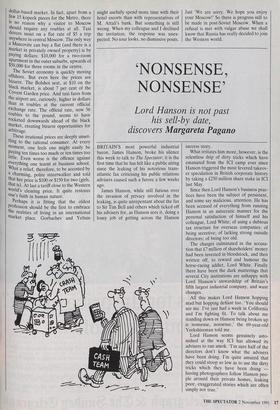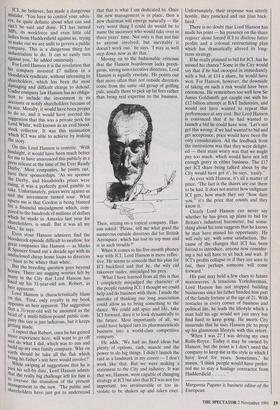'NONSENSE, NONSENSE'
Lord Hanson is not past his sell-by date,
discovers Margareta Pagano BRITAIN'S most powerful industrial baron, James Hanson, broke his silence this week to talk to The Spectator; it is the first time that he has felt like a public airing since the leaking of his notorious trans- atlantic fax criticising his public relations advisers caused such a furore a few weeks ago.
James Hanson, while still furious over the invasion of privacy involved in the leaking, is quite unrepentant about the fax to Sir Tim Bell and others which ticked off his advisers for, as Hanson sees it, doing a lousy job of getting across the Hanson success story.
What irritates him more, however, is the relentless drip of dirty tricks which have emanated from the ICI camp ever since Hanson triggered the most fevered takeov- er speculation in British corporate history by taking a £250 million share stake in ICI last May.
Since then Lord Hanson's business prac- tices have been the subject of persistent, and some say malicious, attention. He has been accused of everything from running Hanson in an autocratic manner for the personal satisfaction of himself and his colleague, Lord White; of using a dubious tax structure for overseas companies; of being secretive; of lacking strong outside directors; of being too old.
The charges culminated in the accusa- tion that £7 million of shareholders' money had been invested in bloodstock, and then written off, to reward and humour the horse-racing addict, Lord White. Finally there have been the dark mutterings that several city institutions are unhappy with Lord Hanson's stewardship of Britain's fifth largest industrial company, and want changes.
All this makes Lord Hanson hopping mad but hopping defiant too. 'You should see me. I've just had a week in Colifornia and I'm fighting fit. To talk about me standing down or Hanson being broken up is nonsense, nonsense,' the 69-year-old Yorkshireman told me.
Lord Hanson seems genuinely asto- nished at the way ICI has allowed its advisers to run amok. 'I'm sure half of the directors don't know what the advisers have been doing. I'm quite amazed that they could stoop so low as to use the dirty tricks which they have been doing — having photographers follow Hanson peo- ple around their private homes, leaking poor, exaggerated stories which are often simply not true.'
he believes, has made a dangerous mistake. `You have to control your advis- ers, be quite definite about what can and can't be said and done. ICI has turned MPs, its workforce and even little old ladies from Huddersfield against us, trying to make out we are unfit to govern a public Fompany. This is a dangerous thing for industrialists to do. It can so easily turn against you,' he added ominously. For Lord Hanson it is the revelation that his company invested £7 million in a bloodstock syndicate, without informing its Shareholders , which has been the most damaging and difficult charge to defend. Under company law Hanson has no obliga- tion to include the investment in its accounts or notify shareholders because of its size. Morally, it would have been proper to do so, and it would have averted the suggestion that this was a private perk for Lord White, well-known as an avid blood- stock collector. It was this insinuation Which ICI was able to achieve by leaking the story.
On this Lord Hanson is contrite. 'With hindsight, it would have been much better for me to have announced this publicly in a press release at the time of the Ever Ready Derby.' Most companies, he points out, have their sponsorships. `As we sponsor the Derby, and bloodstocks prices were rising, it was a perfectly good gamble to take. Unfortunately, prices were against us and the investment turned sour. What Upsets me is that Gordon is being blamed for a financial misjudgment which, com- pared to the hundreds of millions of dollars which he made in America last year for shareholders, is small. But it was all my idea, he says.
Even stout Hanson admirers find the bloodstock episode difficult to swallow, for great companies like Hanson — as Marks & Spencer found out a decade ago with its undisclosed cheap home loans to directors — have to be whiter than white.
But the breeding question goes beyond horses. There are nagging worries felt by in. any in the City that Lord Hanson has lined up his 31-year-old son, Robert, as heir apparent. Lord Hanson is characteristically blunt on this. `First, only royalty in my book appoints an heir apparent. The suggestion that a 31-year-old will be anointed as the head of a multi-billion-pound public com- Pany this size is just ludicrous, but it keeps getting made. 'I expect that Robert, once he has gained More experience here, will want to go off and do what I did, which was to run and build up my own family company. Why on earth should he take all the flak which being his father's son here would involve?' While swiping at suggestions that he is Past his sell-by date, Lord Hanson admits that the really big challenge left for him is to oversee the transition of the present Inanagement to the new. 'The public and Shareholders have just got to understand
that that is what I am dedicated to. Once the new management is in place, then a new chairman will emerge naturally — the very worst thing I could do would be to name the successor who would take over in three years' time. Not only is that not fair to anyone involved, but inevitably it doesn't work out,' he says. `I may as well step down now as do that.'
Moving on to the fashionable criticism that the Hanson boardroom lacks presti- gious, strong non-executive directors, Lord Hanson is equally resolute. He points out that more often than not outside directors come from the same old group of golfing pals, usually there to pick up fat fees rather than bring real expertise to the business.
Then, seizing on a topical company, Han- son asked: 'Please, tell me what good the numerous outside directors did for British Aerospace, which has lost its top man and is in such trouble?'
When it comes to his five-month phoney war with ICI, Lord Hanson is more reflec- tive. He seems to concede that his plan for ICI backfired and that he, the wily old takeover raider, misjudged his prey. 'What I have learned from all this is that I completely misjudged the character of the people running ICI: I thought we could help and do business with them. I made the mistake of thinking our long association could allow us to bring something to the dance. We could add spice and life, take ICI forward, dare it to look dynamically to the future. Most importantly of all, we could have helped turn its pharmaceuticals business into a world-class competitive company.'
He adds, 'We had no fixed ideas but plenty of options, cash, muscle and the power to do big things. I didn't launch the raid as a landmark in my career — I don't work like that. But we were making a statement to the City and industry. It was that we, Hanson, were capable of changing strategy at ICI but also that ICI was not too important, too invulnerable or too in- violate to be shaken up and taken over. Unfortunately, their response was utterly hostile, they panicked and our plan back- fired.'
There is no doubt that Lord Hanson has made his point — his presence on the share register alone forced ICI to disclose fatter profits and a colossal restructuring plan which has dramatically altered its long- term strategy.
If he really planned to bid for ICI, has he missed his chance? Some in the City would say that if he had swooped in immediately with a bid, at £14 a share, he would have won. For Hanson, however, the downside of taking on such a risk would have been enormous. He remembers too well how Sir James Goldsmith got caught out with his .E12 billion attempt at BAT Industries, and would not have wanted to repeat that performance at any cost. But Lord Hanson is convinced that if he had wanted to launch a bid he could have won. 'Let's not get this wrong: if we had wanted to bid and get acceptance, price would have been the only consideration. All the feedback from the institutions was that they were delight- ed — their main worry was that we might pay too much, which would have not left enough gravy in either business. The £17 per ICI share being talked about by the City would have got it', he says, 'easily.'
As ever with Hanson, it's all a matter of price. 'The fact is the shares are out there to be had. It does not matter how indignant ICI gets, how much they say "how dare you," it's the price that counts and they know it.'
Clearly Lord Hanson can never say whether he has given up plans to bid for Britain's industrial barometer, but some- thing about his tone suggests that he knows he may have missed his opportunity. He will only say, with some satisfaction, 'Be- cause of the changes that ICI has been forced to introduce, anyone now consider- ing a bid will have to sit back and wait. If ICI's profits collapse or if they are seen to fail, then perhaps someone will come forward.'
His past may hold a few clues to future manoeuvres. A tenacious Yorkshireman, Lord Hanson has not stopped building businesses since his father handed him part of the family fortune at the age of 21. With tentacles in every corner of business and political life, he leads the lifestyle which a man half his age would not just envy but find hard to keep going. He meets City innuendo that he uses Hanson plc to prop up his glamorous lifestyle with this retort: 'When I was 27 I was driving my own Rolls-Royce. Today it may be owned by Hanson, but the point is I don't need the company to keep me in the style in which I have lived for years. Sometimes,' he muses, 'I think people would have prefer- red me to stay a haulage contractor from
Huddersfield Margareta Pagano is business editor of the European



































































 Previous page
Previous page